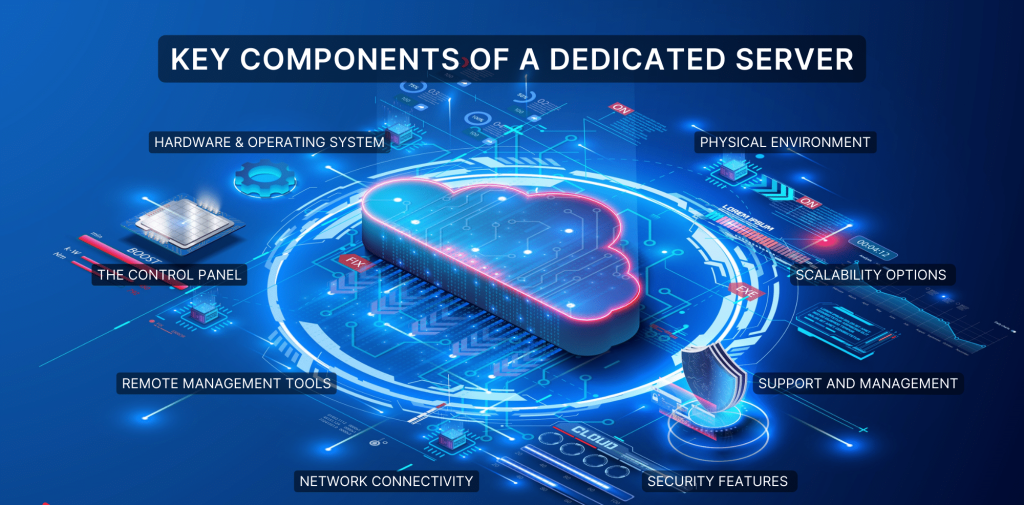Table of Contents
What Is a Dedicated Server?

A dedicated server refers to a type of hosting service where an entire physical server is allocated to a single user or organization. In contrast to shared hosting, where multiple users share resources on the same server, a dedicated server provides exclusive access to the entire server hardware and its resources.
Why Would you need a Dedicated Server?
A dedicated server is known as one of the highest-performance hosting options. We like to think of a dedicated server like owning your own house. No one will bother you and you can do whatever you’d like. Whereas a shared server is much like living in condo where you have to share everything.
Dedicated servers allow for:
24/7 uptime
Faster connection speeds
Less risk of virus attacks
Maintenance on the fly
Dedicated servers aren’t specifically designed for one purpose. They can be used to host websites, game servers, or anything that requires a place for multiple computers to store and read files.
Dedicated Server Components:

Processor (CPU): The central processing unit is responsible for executing instructions and performing calculations. The CPU’s speed and number of cores significantly influence the server’s processing power.
Random Access Memory (RAM): RAM is used for temporarily storing data that the CPU needs to access quickly. More RAM allows the server to handle larger amounts of data and concurrent processes, improving overall performance.
Storage: Dedicated servers have one or more hard disk drives (HDDs) or solid-state drives (SSDs) for data storage. HDDs offer larger storage capacities at a lower cost, while SSDs provide faster read and write speeds, enhancing overall system performance.
Motherboard: The motherboard serves as the main circuit board, connecting and facilitating communication between the various components, such as the CPU, RAM, storage devices, and peripheral devices.
Remote Management Interface: Many dedicated servers come with a remote management interface (such as IPMI or iDRAC) that allows administrators to access and manage the server remotely, even if the operating system is not responsive.
Graphics Processing Unit (GPU): While not always included, some dedicated servers may be equipped with GPUs for specific tasks such as data processing, scientific computing, or graphics rendering.
Operating System (OS): The operating system is the software that manages hardware resources and provides a user interface. Popular server operating systems include Linux distributions (e.g., CentOS, Ubuntu Server) and Windows Server.
Benefits of a Dedicated Server

- Enhanced Performance
Organizations that opt for dedicated servers do not share computing resources with others. This boosts the performance across many applications, such as websites and databases.
- Higher Security
Opting for a dedicated server means that no one else has access to the server, potentially boosting business security. You can also enforce firewall controls to further enhance the security of your assets without impacting performance.
- Improved Flexibility
Unlike a cloud server, you can use a dedicated server for virtually anything ranging from web hosting and e-commerce to Virtual Private Networks (VPNs) and email servers.
- Easy Customization
Unlike a shared server, your IT administrators have full control of the dedicated server. As such, they can easily customize the CPU, RAM, disk space and software based on the organization’s needs.
- Constant On-Premises Support
Organizations that use dedicated servers can rest easy knowing that their servers are backed with 24/7 support from an on-site professional.
Use Cases for Dedicated Servers
Organizations can use dedicated servers in a variety of ways, including:
High-Traffic Websites:
Dedicated servers are ideal for websites with high traffic volumes that demand consistent performance and fast loading times.
Examples include popular blogs, e-commerce platforms, and content-heavy websites.
E-commerce Platforms:
Online stores handling sensitive customer information benefit from the enhanced security and reliability provided by dedicated servers.
Dedicated resources ensure a seamless shopping experience, even during peak times.
Business Applications:
Dedicated servers are suitable for hosting critical business applications, such as enterprise resource planning (ERP) systems, customer relationship management (CRM) software, and collaboration tools.
Businesses can customize the server environment to meet specific application requirements.
Media Streaming:
Dedicated servers are often used for hosting media streaming services, ensuring a smooth and uninterrupted streaming experience for users.
Streaming platforms, online video services, and live broadcasting can benefit from the dedicated resources.
Game Servers:
Dedicated servers are popular for hosting online multiplayer game servers. They provide low-latency connections and high performance, offering a better gaming experience.
Game developers and gaming communities often use dedicated servers for hosting game sessions.
Development and Testing Environments:
Developers can use dedicated servers for creating isolated development and testing environments.
This allows for testing software, applications, and websites in a controlled and customizable setting.
Private Cloud Hosting:
Dedicated servers can serve as the foundation for private cloud infrastructures, offering businesses a scalable and customizable cloud environment.
This is suitable for organizations that require the benefits of cloud computing but need more control over their infrastructure.
Financial and Trading Applications:
High-frequency trading applications and financial platforms that require low-latency and high-performance computing often use dedicated servers.
These applications demand real-time data processing and rapid execution of financial transactions.
Compliance-Driven Hosting:
Industries with strict regulatory compliance requirements, such as healthcare, finance, or government, may choose dedicated servers to maintain control over security measures and meet specific compliance standards.



